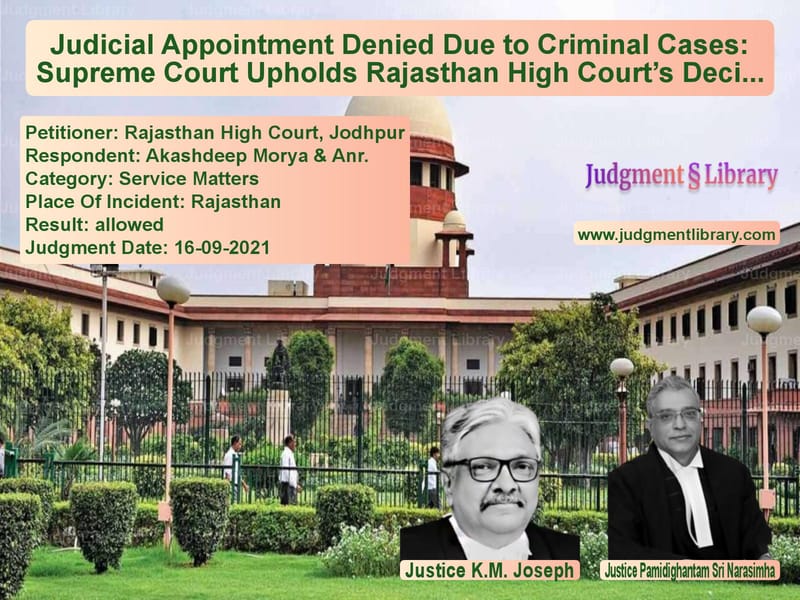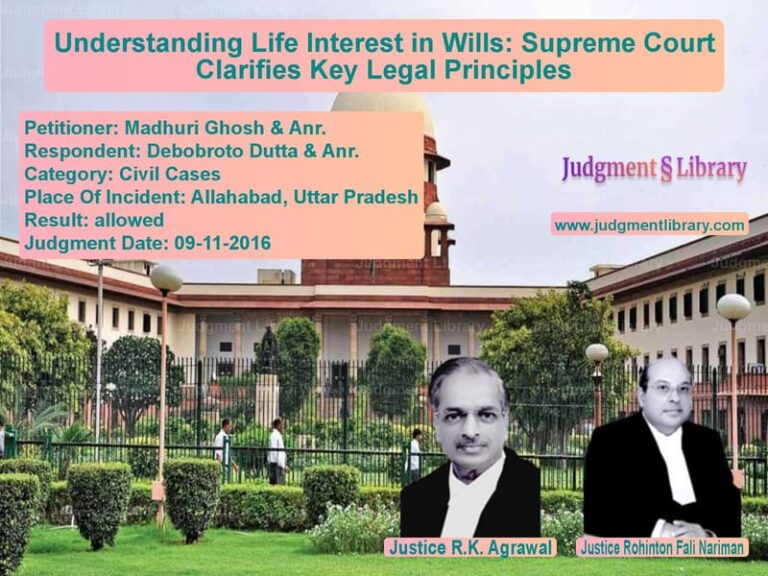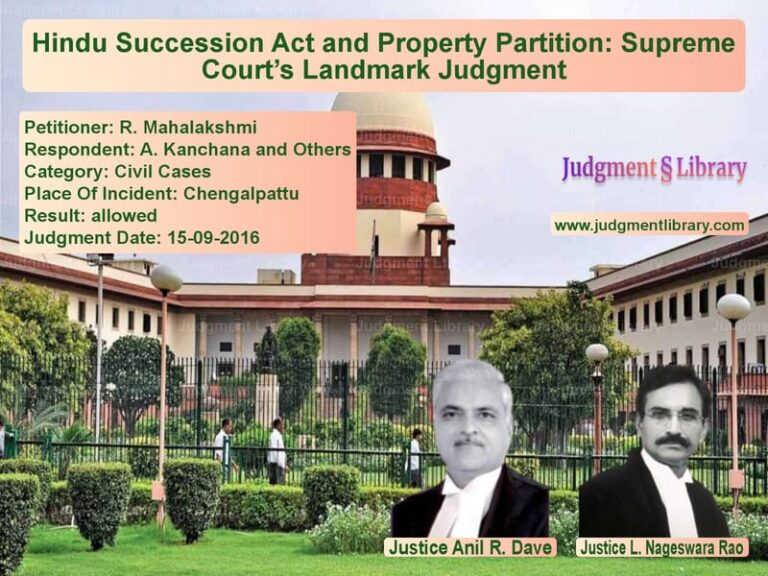Judicial Appointment Denied Due to Criminal Cases: Supreme Court Upholds Rajasthan High Court’s Decision
The case of Rajasthan High Court, Jodhpur vs. Akashdeep Morya & Anr. dealt with the rejection of a candidate’s appointment to the judicial service due to his prior involvement in criminal cases. The Supreme Court had to decide whether the rejection was justified despite the candidate’s acquittal in all cases. The ruling reaffirms the principle that a judicial officer must meet the highest standards of integrity and character.
Background of the Case
The Rajasthan High Court issued a notification on November 25, 2013, inviting applications for the post of Civil Judge (Junior Division). Akashdeep Morya applied for the position and disclosed that he had been implicated in several criminal cases in the past. These cases involved allegations under various sections of the Indian Penal Code (IPC), including Sections 341, 323, 147, 148, 149, 504, 324, 420, 406, 120B, and 452.
The verification process revealed the following cases:
| FIR No. | Sections Invoked | Case Outcome |
|---|---|---|
| 81/1999 | 341, 323, 147, 148, 149, 504, 324 IPC | Acquitted on compromise (2011) |
| 75/2011 | 420, 406, 120B IPC | Final Report accepted (2011) |
| 106/2011 | 452, 323, 34 IPC | Final Report accepted (2011) |
| 98/2012 | 341, 323, 324, 34 IPC | Acquitted on compromise (2012) |
Legal Issues Raised
- Whether the rejection of the candidate’s appointment was justified despite his acquittal in all criminal cases.
- Whether the Rajasthan High Court properly applied the principles laid down in Avtar Singh vs. Union of India (2016) regarding criminal antecedents and public employment.
- Whether the rejection was discriminatory or violated principles of fairness.
Petitioner’s Arguments (Rajasthan High Court)
The Rajasthan High Court argued:
- The appointment of a judicial officer requires the highest moral standards.
- The candidate had multiple criminal cases against him, including allegations of physical assault using weapons.
- The acquittals were based on compromises rather than a clean exoneration.
- Under Avtar Singh, an employer has the discretion to assess the suitability of a candidate based on their criminal history.
Respondent’s Arguments (Akashdeep Morya)
The respondent contended:
- He had voluntarily disclosed his criminal cases, demonstrating transparency.
- Two of the cases had been dismissed as false, and the other two ended in compromise, which is permissible under Indian law.
- He belonged to the Scheduled Caste community and was being unfairly denied employment despite clearing the examination.
- The Rajasthan High Court’s decision was arbitrary and contradicted the principles laid down in Avtar Singh.
Supreme Court’s Judgment
The Supreme Court ruled in favor of the Rajasthan High Court, setting aside the High Court’s order that had directed reconsideration of the candidate’s application.
Key Observations by the Court:
“The incumbent of a judicial post discharges one of the most important functions of the State, that is, the resolution of disputes involving the people of the country. Judges occupying the highest moral ground go a long way in building public confidence in the justice delivery system.”
“The post of a Civil Judge or a Magistrate is of the highest importance notwithstanding the fact that in the pyramidical structure of the judiciary, the Civil Judge or the Magistrate is at the lowest rung.”
Application of Avtar Singh Principles:
- If an acquittal is based on a compromise or lack of evidence, the employer may still assess the suitability of the candidate.
- Judicial officers must meet a higher standard of integrity and any history of criminal allegations, even if resolved, can be considered in employment decisions.
- The rejection of the candidate was not arbitrary, as the decision-making process was well-reasoned and involved multiple levels of review.
Impact of the Judgment
- Reaffirmed the principle that judicial officers must be held to the highest ethical standards.
- Clarified that acquittals based on compromise do not equate to a clean record.
- Strengthened the discretionary powers of employers in judicial appointments.
Conclusion
The Supreme Court’s ruling in Rajasthan High Court, Jodhpur vs. Akashdeep Morya highlights the importance of ethical standards in judicial appointments. It reinforces that while the law allows compromise in criminal cases, such resolutions do not automatically entitle a person to public employment in sensitive positions. This judgment serves as a precedent for ensuring that individuals appointed to judicial positions maintain the highest standards of integrity and character.
Petitioner Name: Rajasthan High Court, Jodhpur.Respondent Name: Akashdeep Morya & Anr..Judgment By: Justice K.M. Joseph, Justice Pamidighantam Sri Narasimha.Place Of Incident: Rajasthan.Judgment Date: 16-09-2021.
Don’t miss out on the full details! Download the complete judgment in PDF format below and gain valuable insights instantly!
Download Judgment: rajasthan-high-court-vs-akashdeep-morya-&-an-supreme-court-of-india-judgment-dated-16-09-2021.pdf
Directly Download Judgment: Directly download this Judgment
See all petitions in Recruitment Policies
See all petitions in Public Sector Employees
See all petitions in Disciplinary Proceedings
See all petitions in Judgment by K.M. Joseph
See all petitions in Judgment by P.S. Narasimha
See all petitions in allowed
See all petitions in supreme court of India judgments September 2021
See all petitions in 2021 judgments
See all posts in Service Matters Category
See all allowed petitions in Service Matters Category
See all Dismissed petitions in Service Matters Category
See all partially allowed petitions in Service Matters Category







